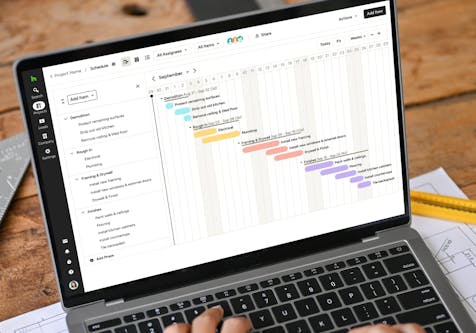General Contractor Licensing Requirements by State
Find the requirements for a general contractor's license in your state, which states don't require a license & which states provide license reciprocity.

General Contractor Licensing Requirements by State
Find the requirements for a general contractor’s license in your state, which states don’t require a license & which states provide license reciprocity.
Are you a new general contractor just starting out, or an experienced one looking to expand your business into another state? Read on to learn the general contractor requirements by state. We have done all the research for you with this comprehensive, searchable list of state-by-state general contractor licensing requirements.
Quick Links: State-by-state general contractor requirements
Search for the state you are most interested in learning about:
- Alabama to Delaware
- Florida to Kentucky
- Louisiana to Montana
- Nebraska to Oregon
- Pennsylvania to Utah
- Vermont to Wyoming
Which states require a general contractor license?
The majority of states have some type of state licensing program for general contractors. However, the rules, fees and requirements governing licenses vary. Here is a list of the 33 states that require a state general contractor license. Dive into a state individually to learn the general contractor license reciprocity by state.
- Alabama
- Alaska
- Arizona
- Arkansas
- California
- Colorado
- Connecticut
- Delaware
- Florida
- Georgia
- Hawaii
- Iowa
- Louisiana
- Maryland
- Massachusetts
- Michigan
- Minnesota
- Mississippi
- Montana
- Nevada
- New Jersey
- New Mexico
- North Carolina
- North Dakota
- Oregon
- Rhode Island
- South Carolina
- Tennessee
- Utah
- Virginia
- Washington
- West Virginia
- Wisconsin
Which states do not require a general contractor license?
Not every state requires general contractors to have a state-issued license to do work in the state. However, in many of these states, rules can vary among counties and cities, so check with your local jurisdiction. Also, they may require speciality contractors such as plumbers and electricians to obtain a license. Here is the list of the 17 states which as of 2024 did not require general contractors to apply for a state general contractor license.

State-by-state contractor license requirements
- State License: Yes
- Registration: No
- In Alabama, a general contractor license is required for anyone who wants to engage in the business of constructing, altering, repairing, or demolishing any building or structure in commercial, industrial and residential work. There are several types of licenses available which renew every two years. You must fill out an application and pass a qualifying exam to obtain a license. Contact the Alabama Licensing Board for General Contractors to learn more about general contractor licensing requirements.
- State License: Yes
- Registration: No
- Alaska differentiates itself from many states by considering general contractors as regulated professionals who are required to hold a specific general contractor license. There are three main types of licenses which vary depending on the type of licensing a contractor is seeking. This includes a general handyman license for contractors who exclusively take on residential or commercial contracts valued less than $10,000. More information is available through the Alaska Department of Commerce, Community, and Economic Development.
- State License: Yes
- Registration: No
- In Arizona, a contractor's license is mandatory for individuals or businesses engaging in activities related to the construction, alteration, repair, expansion, reduction, enhancement, relocation, demolition, or any work on buildings, highways, roads, railroads, excavations, structures, developments, or improvements, whether through contracting or offering to contract. The Arizona Registrar of Contractors is responsible for issuing general contractor licenses in Arizona. It is the governing body that sets and enforces the general contractor license requirements. To get a comprehensive understanding of the classifications available we recommend referring to the Arizona Registrar of Contractors' (AROC) informative breakdown of license categories.
- State License: Yes
- Registration: No
- All commercial contractors working on projects other than single-family residences with a contract value of $50,000 or more need a general contractors license in Arkansas. Additionally, residential contractors are required to have a license if they work on projects over $2,000. The Arkansas Contractors Licensing Board is in charge of issuing general contractor licenses– both commercial and residential.
- State License: Yes
- Registration: Yes
- California requires any business or individual looking to make alterations or constructions to any structure in the state to obtain a license if the total cost of one or more contracts on the project exceeds $500.Most general contractors should apply for Class B: General Building Contractor. Four years experience in the field is one of the license requirements. The California Department of Consumer Affairs Contractors State License Board (CSLB) is the governing body for general contractor licensing. Register your business with the secretary of state’s office.
- State License: Yes
- Registration: No
- If you plan to oversee construction projects, obtain building permits, and supervise subcontractors in the state of Colorado, you'll need to obtain a license. Requirements vary depending on the area of the state such as Colorado Springs, for example. More information is available from the Colorado Department of Regulatory Agencies (DORA).
- State License: Yes
- Registration: Yes
- Most types of general contractors in Connecticut are required to either seek a license or register their business with the state. The fee for a general contractor’s license is $500, and renews annually at a cost of $220. When applying for your license, submit a certificate that demonstrates your contracting business is registered with the Connecticut Secretary of State.The Department of Consumer Protection (DCP) is the licensing agency for general contractors.
- State License: Yes
- Registration: Yes
- Anyone intending to undertake construction tasks must obtain a license. In addition to general contractor licenses, Delaware administers separate licensing procedures through the Division of Professional Regulation for distinct categories, including electricians, plumbers, water drillers and HVAC professionals. The state also distinguishes between resident and non-resident contractors when issuing licenses. Register your business with the Delaware Division of Revenue.

- State License: Yes
- Registration: Yes
- If the total cost of one or more of your contracts on a construction project you are doing for a structure in Florida exceeds $500, you are required to obtain a license. There are two types of classifications of license for general contractors, one that covers work throughout the state, and the other which limits work to specific local jurisdictions. Requirements include passing a background check, including fingerprinting, and passing the Florida State Construction Examination. If you are a small business, you must register your business through the Florida Department of Revenue. Corporations, nonprofits, LLCs and partnerships are required to register through the Florida Division of Corporations.
- State License: Yes
- Registration: Yes
- Individuals and companies intending to engage in construction or improvements on residential or commercial buildings in Georgia are required to carry a general contractors license. For most trades, a license is not mandatory, except for roofing. However, if you work in two or more of the following specialties, you must obtain a license: carpentry, drywall, exterior finishing,interior finishing, excavation, roofing or masonry. You also must register your general contractor business with the state and can do so by visiting the Georgia Secretary of State website.
- State License: Yes
- Registration: Yes
- In most cases, Hawaii requires general contractors to obtain a license and pass a test. The sole exception is when the contract for the project totals less than $1,000. The license fees vary greatly depending on the timing of your application: If you secure your license between October 1st of an odd-numbered year and September 30th of an even-numbered year, it is about $150 less than If you obtain your license between October 1st of an even-numbered year and September 30th of an odd-numbered year. Begin by completing and submitting a Hawaii general contractor license application to the Contractors' License Board. Check out the registration requirements too.
- State License: No
- Registration: Yes
- While specialty contractors are required to obtain a contractor's license in Idaho, general contractors only need to complete a registration process with the Idaho Bureau of Occupational Licenses. This registration procedure does not have specific prerequisites regarding formal education, prior experience, or mandatory exams.
- State License: No
- Registration: No
- In Illinois, the majority of construction licensing is managed at the local level by cities or counties. The only exception to this is the issuance of an Illinois roofing license, which is administered by the Illinois Department of Public Health. It is imperative to contact the respective city or municipal authorities before commencing any construction projects to ensure that your business fully complies with local regulations. In Chicago, for example, there are five types of general contractor licenses that vary depending on the cost of the projects being undertaken.
- State License: No
- Registration: No
- There is no statewide license requirement for individuals working as general contractors. Instead, licensing is overseen at the municipal or county level. It is crucial to verify the specific licensing prerequisites with local authorities before commencing any work. Notably, plumbing is the sole profession in Indiana subject to state-level regulation.
- State License: Yes
- Registration: Yes
- A general contractor license is required for any contractor who plans to work on projects that exceed $2,000 in value in Iowa.This means that whether you're a residential contractor, a commercial contractor, or a remodeling contractor, if you meet the monetary threshold, you must have a valid license. The Iowa General Contractor License is issued by the Iowa Division of Labor Services. Depending on your specific type of contracting work, register for either construction contractor, contractor, or both licenses.
- State License: No
- Registration: Yes
- Kansas is one of the states that does not impose any statewide contractor licensing requirements. But it's important to note that many counties and local jurisdictions within the state have established their own regulations regarding contractor licensing. Regardless of jurisdiction, any business intending to operate in Kansas must first register with the Kansas Secretary of State's Office. Check with your local government to learn more about licensing requirements in your area.
- State License: No
- Registration: Yes
- Kentucky mandates state-issued licenses solely for electrical contractors, plumbing contractors, and HVAC contractors. These licenses are issued through the Kentucky Department of Housing, Building, and Construction. For all other professions, licensing procedures are managed by local municipalities and counties. If you plan to own a contracting company in Kentucky, you can register your business, obtain a Federal Employer Identification Number, and complete other tax requirements through Kentucky's One Stop Business Portal.

- State License: Yes
- Registration: Yes
- For those looking to start a contracting business in Louisiana in 2024, you must obtain a license in order to legally operate. There are different types of contractor licenses including ones for commercial, residential and mold remediation work. The Louisiana State Licensing Board for Contractors (LSLBC) governs the licensing requirements and divides contractors into different categories based on the scope of work and contract price of the anticipated projects. Before applying for a Louisiana contractor's license, you must be registered with the Louisiana Secretary of State.
- State License: No
- Registration: No
- Rather than administering general contractor licenses at the state level, Maine delegates licensing authority to individual municipalities and towns. However, for plumbing and electrical contractors a state-level license is required. Other contractors are required to abide by the licensing regulations of local jurisdictions so research the requirements in your area. Some cities, such as Portland also require general contractors to register their business name.
- State License: Yes
- Registration: Yes
- A Maryland general contractor license is required if you wish to work on home improvement projects or do electrical, plumbing, or HVACR work in the state.Both the Maryland Home Improvement Commission (MHIC) and Department of Labor, Licensing and Regulation (DLLR) are responsible for administering all MD general contractor licenses. An exam is required for a general contractors license and you must register your business name in Maryland, you should first reach out to the Maryland Home Improvement Commission to verify the availability of the name by calling 410-230-6309. After you have confirmed your name, you can proceed to register it with the Maryland Department of Assessment and Taxation.
- State License: Yes
- Registration: Yes
- General contractors and specialty trades professionals are obliged to possess a state-issued license in Massachusetts. On the other hand, home improvement contractors are mandated to register their businesses. In certain situations, it may be necessary to fulfill both licensing and registration requirements. A 70 % score or higher is required on the general contractors exam, and the types of license for general contractors vary. The Massachusetts general contractor license is issued by the Massachusetts Division of Professional Licensure (DPL).
- State License: Yes
- Registration: No
- In Michigan, a general contractor license is required for any construction project over $600. The license is issued by the Michigan Department of Licensing and Regulatory Affairs (LARA), and it is valid for three years. Michigan offers two main types of contractor licenses, one is the residential builders license and the other covers speciality trades.
- State License: Yes
- Registration: Yes
- In order to get a Minnesota general contractor's license, you must first register your business by disclosing your business name, address, and any partners or business owners who share more than 10 percent of your company. You can do this by visiting the Minnesota Secretary of State website. After you register your business you must take licensing exams for contractors administered by the state of Minnesota's Department of Labor and Industry. Individuals and companies intending to engage in construction or improvements on residential or commercial buildings in Minnesota are required to carry a Minnesota general contractors license. For most trades, a license is not mandatory, except for roofing. Also if you work in two or more specialities as outlined by the state, you will also need a license.
- State License: Yes
- Registration: Yes
- Mississippi mandates that all contractors, whether engaged in commercial or residential work, including roofers, must secure a license. The Mississippi State Board of Contractors is responsible for issuing general contractor licenses. The licensing process involves an application, examination, and other documents like reference letters and proof of employment. Also, If your business is a corporation or LLC, it must be registered with the Mississippi Secretary of State.
- State License: No
- Registration: Yes
- The state does not provide a statewide general contractors license. This means that the application process, requirements, and fees for obtaining a license will vary depending on the local issuing authority in your city. In Kansas City, MO, for example, all contractor licenses in KC are issued through the Kansas City, MO City Planning and Development – Developmental Services department. In St. Louis, all contractors must go through the St. Louis Building Division – Permit Section to obtain a building permit to perform contracting work in the city. No matter your location in Missouri, to operate a business, you need to register it with the Missouri Secretary of State and secure all necessary tax ID numbers, a certificate of insurance, and contractor bonds for all projects.
- State License: Yes
- Registration: Yes
- In Montana, individuals involved in activities such as building, altering, repairing, expanding, reducing, enhancing, relocating, demolishing, or wrecking structures, highways, roads, railroads, excavations, or any other real estate-related project or development must possess a valid license. Montana provides options for both Independent Contractor Registration and Construction Contractor Registration, and the choice between them depends on your business's structure. Both registration processes are administered by the Department of Labor and Industry. Montana places significant importance on compliance with its licensing and registration prerequisites. Construction contractors who engage in work without proper registration or licensing may face penalties of $500 for each instance.

- State License: No
- Registration: Yes
- Nebraska contractor licensing differs from other states. It's county-based, so you’ll need to research your specific county's requirements. However, not all contractors are required to pursue licensing. Specialty contractors, handyman businesses earning less than $5,000 each year, and contractors working in counties with populations of less than 100,000 are exempt from the licensing requirements. Even though licensing may not be mandatory, nearly all contractors are obligated to register their businesses through the Nebraska Department of Labor.
- State License: Yes
- Registration: Yes
- Any business or person who plans to change or construct a building, parking facility, road, railroad or other structure in the state of Nevada needs a Nevada general contractor license.The Nevada State Contractors Board is the governing body for administering general contractor licenses there. The licenses are divided into three different classifications: Class A: General Engineering Contractor License;Class B: General Building Contractor License and Class C: Specialty Contractor License. Contractors also must register their business with the Nevada Secretary of State.
- State License: No
- Registration: Yes
- There's no official licensing board for general contractors in New Hampshire, but you should consult your local city or county requirements to make sure you follow the rules before doing any general contracting work.In New Hampshire, there isn't a clear definition of what it means to be a "general contractor" but if you work in specialties such as electrical or plumbing, you'll need to go through a licensing process. Also, If you're planning to run a general contracting business in New Hampshire, you'll definitely need to register with the Secretary of State. The process for registering can be a bit tricky, and the information on the Secretary of State's website is limited, but it's definitely something you'll want to look into.
- State License: Yes
- Registration: Yes
- The Contractors' Registration Act requires any contractor who provides home improvement services in the state to register with the Division of Consumer Affairs. However, plumbers and electricians are not included and must be licensed separately. Businesses that engage in any of the following must acquire a New Jersey general contractor license:
- Construction
- Installation
- Remodeling
- Altering
- Painting
- Repairing
- Renovating
- Restoring
- Moving
- Demolishing
The New Jersey Division of Consumer Affairs is responsible for issuing general contractor licenses in accordance with the New Jersey Contractor’s Registration Act.
- State License: Yes
- Registration: Yes
- According to the Construction Industries Licensing Act, all construction-related contracting in New Mexico requires a license, including general construction work, electrical, mechanical, plumbing, and LP gas. The act provides a comprehensive list of activities that fall under the category of "contracting" and can be found here. The Construction Industries and Manufactured Housing Division (CID) of the New Mexico Regulation & Licensing Department is responsible for issuing general contractor licenses in New Mexico. The fees for licensing and registration as a contractor vary depending on your classification. For detailed information about licensing fees in New Mexico, please refer to this resource.
- State License: No
- Registration: No
- Obtaining a license for general contractors in New York is relatively simple, as only two types of contractors, asbestos and crane operators, are required to hold a state license. All other types of New York general contractor licenses are obtained through the city. Usually, a permit or license from the city is necessary for general contractors. Requirements and licensing vary from city-to-city and differing counties, so it is important that contractors in New York check their local regulations before beginning work in their area. In New York, NY: general contractors in New York City must be licensed by the NYC Department of Consumer Affairs. In Buffalo, NY: Contracting licenses are regulated by the Buffalo Department of Economic Development, Permit and Inspection Services Office of Licenses.
- State License: Yes
- Registration: Yes
- Under North Carolina law, all contractors who wish to perform work on projects worth $30,000 or more must obtain contractors’ licenses.The North Carolina Licensing Board for General Contractors issues various licenses to contractors, which are categorized based on limitations and classifications.There are three license limitations for general contractors. If you are a small business, you must register your business through the North Carolina Department of Revenue Corporations, nonprofits, LLCs and partnerships are required to register through the North Carolina Secretary of State .
- State License: Yes
- Registration: Yes
- In North Dakota, general contractor licenses are typically issued by the North Dakota Secretary of State's Office. However, it's essential to note that the specific licensing requirements and processes may vary by city or municipality within the state. When working in construction-related fields in North Dakota, it is essential to obtain a general contractor license to comply with licensing regulations. While there is an exception to this requirement for contracts that are not worth more than $4,000, this only applies to individual contracts and not cumulative contracts. If you are a business entity, start by registering your business with the North Dakota Secretary of State. Use the North Dakota Online Services portal to create a business account and complete the online contractor application.
- State License: No
- Registration: No
- In Ohio, not all contractors are subject to state licensure. The requirement for a contractor license at the state level primarily applies to plumbers, electricians, HVAC contractors, hydronic technicians, and refrigeration installers.Other general contractors may not be subject to such state-level licensure requirements, however, certain cities and municipalities will require licensing. To obtain a license in Ohio, the mentioned contractors must apply through the Ohio Construction Industry Licensing Board.
- State License: No
- Registration: No
- A state license for general contractor work is not available in Oklahoma. Nevertheless, if you're engaged in specialty trades like plumbing, electrical, and mechanical contracting, you'll need to acquire a contractor's license. You must also comply with the requirements of the Oklahoma Construction Industries Board, which might involve providing evidence of your work experience, taking exams, and paying associated fees.
- State License: Yes
- Registration: Yes
- In Oregon, all individuals who receive compensation for their work in any construction project that involves improvements to real property must hold a valid license.The Oregon Construction Contractors Board (CCB). is responsible for issuing general contractor licenses in Oregon. It is essential to determine which type of endorsement is suitable based on the types of structures your business will specialize in. There are nine residential endorsement types available. As per Oregon general contractor license requirements, in order to register your business in Oregon, you must file as a corporation, LLC, or assumed business name with the Corporation Division of the Oregon Secretary of State. You can reach them by calling 503-986-2200. More information on starting a business in the state of Oregon can be found here.

- State License: No
- Registration: Yes
- Licensing in Pennsylvania varies from city to city. However, it is highly probable that a general contractor operating in Pennsylvania would need to register as a home improvement contractor with the PA Attorney General in order to provide contractor services in your local jurisdiction. This registration is mandatory at the state level. Just like licenses for plumbers or electricians, your Pennsylvania general contractor's license will be overseen by the city where you operate. To fulfill the Pennsylvania contractor license requirements, any contracting business that earns over $5,000 annually must register with the Pennsylvania State Attorney General’s Office as a home improvement contractor.
- State License: Yes
- Registration: Yes
- In Rhode Island, anyone involved in residential and commercial contracting, as well as subcontracting, must complete registration with the state's Contractors' Registration and Licensing Board (CRLB). In this state, it is essential to distinguish between registration and licensing, as the latter is obligatory only for specific trades, including electrical, plumbing, mechanical, and HVAC. Registering as a contractor in Rhode Island is a necessary step for various contractor types, including general contractors and subcontractors. Start by registering your business with the Contractor's Registration and Licensing Board.
- State License: Yes
- Registration: No
- There are two main types of licenses available in South Carolina for general contractors depending on the type of work you plan to do. First there is the General and Mechanical Contractor License for those overseeing and managing a wide range of construction projects. Next there is the Residential Contractor License for those focused specifically on residential construction. Anyone who wants to legally work as a general contractor must obtain a general contractor license. The South Carolina Contractor License Board (SCCLB) under the Department of Labor, Licensing and Regulation is responsible for licensing and sets strict requirements that must be met.
- State License: No
- Registration: No
- While there are no state-issued licenses for general contractors in South Dakota, that doesn't mean there are no requirements or registrations to consider. All contractors engaged in construction in South Dakota need to register for a South Dakota Contractor's Tax License with the South Dakota Secretary of State. Additionally, some cities and counties may issue residential building licenses. It's important to check with your local jurisdiction to understand their specific requirements and processes.
- State License: Yes
- Registration: Yes
- In Tennessee, both general contractors and subcontractors may be required to hold a contractor's license, depending on the project. Whether or not you need a Tennessee general contractor license depends on the size and scope of the project you plan to undertake. The regulations in the state are established by the Tennessee Board for Licensing Contractors.The types of licenses vary depending the scope and size of the projects you do. Register your business with the Tennessee Secretary of State for legal recognition and operation in the state.
- State License: No
- Registration: Yes
- Not all contractors in Texas need to hold a license. Whether or not you need a license depends on your trade and the area in which you’re working. If you are a handyman, general contractor, or builder, the state does not require you to carry a license issued by the state. Contractors that specialize in other trades such as plumbers, electricians, and HVAC technicians need to hold a Texas contractor license. No matter what your status as a contractor, if you run a business in Texas you do need to register it with the Texas Secretary of State and secure all necessary tax ID numbers, a certificate of insurance, and contractor bonds for all projects.
- State License: Yes
- Registration: Yes
- In Utah, anyone who wants to work as a general contractor is required to obtain a Utah general contractor license.The Utah Division of Occupational and Professional Licensing (DOPL) oversees the issuance of Utah general contractor licenses, and sets the Utah general contractor license requirements. It is important to note that there are several types of Utah contractor licenses available so do your research to determine which one fits your business and services offered. When applying for a license, you will also need to pay a business registration fee through the State of Utah Department of Commerce.

- State License: No
- Registration: No
- Vermont does not issue an overall general contractor's license. However, certain specialty trades such as electrical and plumbing contractors are obliged to fulfill specific licensing prerequisites. It's also important to note that some local cities and counties have their own specific licensing requirements.
- State License: Yes
- Registration: No
- Anyone overseeing or participating in a project, whether it involves construction, renovation, repair, or enhancement, with a value exceeding $1,000, is obligated to possess a license.General contractor licenses are categorized based on project value and the cumulative worth of contracts. Likewise, tradesmen such as plumbers, electricians, HVAC technicians, gas fitters, and other specialized contractors must also possess state-issued licenses.
- State License: Yes
- Registration: Yes
- All contractors working in Washington State must register with the Department of Labor and Industries.There are two types of registration categories for contractors: general contractors and specialty contractors. It's important to note that if your company employs subcontractors, regardless of your work type, registration as a general contractor is mandatory. Notably, specialty contractors in Washington are prohibited from subcontracting work.
- State License: Yes
- Registration: Yes
- Before you can apply for a general contractors license in West Virginia, you must contact the The West Virginia Contractor Licensing Board board and provide details about your work. This will help the board determine the appropriate classification for your license and inform you about the exams that you must take. All types of businesses, including contractors, subcontractors, specialty trades, handyman businesses, sole proprietors, and self-employed individuals, are required to register with the State's Tax Department.
- State License: Yes
- Registration: No
- Wisconsin does require a contractor license for anyone who wants to work in the construction industry. To become a licensed general contractor in Wisconsin, you'll need to meet certain requirements and go through the licensing process. In Wisconsin, the Department of Safety and Professional Services (DSPS) is responsible for overseeing and issuing general contractor licenses. They have specific requirements that must be met in order to obtain a license, including completing an application, submitting the necessary documentation, and passing the required exams.
- State License: No
- Registration: Yes
- Wyoming operates with minimal statewide regulations when it comes to licensing contractors. With the exception of electrical contractors, the state delegates licensing authority to individual counties or municipalities. However, having a license in one municipality doesn't grant the freedom to operate in others. Contractors active across various cities or counties might need separate licenses for each jurisdiction. The majority of contractors in Wyoming will need to carry out business registration with the Secretary of State. This registration process is quite straightforward, as the Secretary of State offers an online portal for registration.

Leveraging your license on Houzz
Now that you understand the general contractor requirements by state it’s time to start thinking about how you can promote your license to potential clients. Everyone who’s anyone knows the value of a blue checkmark on social media. That’s what the green Verified License Badge is for businesses on Houzz Pro. With one glance, this Badge helps you:
- Let homeowners know that your business is licensed by state industry experts.
- Stand out from the competition while homeowners consider who to hire.
- Add credibility to your company name, providing peace of mind to future clients
Here are the steps you can take to add a verified license to your Houzz profile. If you haven’t created a free profile on Houzz, sign up today and get ready to make a bigger impact with your business’ online presence.
Conclusion
Continue learning and explore our guide on how to become a general contractor in addition to fulfilling your licensing requirements. Next, dive into how to start a general contractor business.

Want advice delivered to your inbox?
Unlock industry insights and updates for contractors and design pros
By signing up, I agree to the Houzz Terms of Use and Privacy Policy and that Houzz may use my information to contact me about relevant content, products, and services.













Join the conversation by commenting or asking a question below. The Houzz team reads every single comment, and we’ll get back to you by email if you need us!